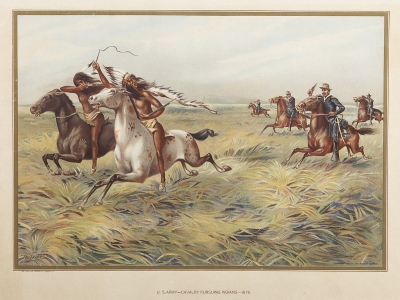The 7th Cavalry Regiment is a United States Army cavalry regiment formed in 1866. Its official nickname is "Garryowen", after the Irish air "Garryowen" that was adopted as its march tune.
The regiment participated in some of the largest battles of the Indian Wars, including the famous Battle of Little Bighorn, where its enigmatic commander, Lieutenant Colonel George A. Custer, made his last stand. The 7th Cavalry became part of the 1st Cavalry Division in the 1920s and went on to fight in the Pacific Theater of World War II, and several key battles of the Korean War, in which it committed the No Gun Ri massacre, and participated in the Vietnam War. It distinguished itself in the Gulf War and in the Global War on Terror where its squadrons and battalions now serve as Combined Arms Battalions (involving tanks and mechanized infantry) or as reconnaissance squadrons for Brigade Combat Teams.
The American Indian Wars, also known as the American Frontier Wars, the First Nations Wars in Canada (French: Guerres des Premières Nations), and the Indian Wars, were fought by European governments and colonists in North America, and later by the United States and Canadian governments and American and Canadian settlers, against various American Indian and First Nation tribes. These conflicts occurred in North America from the time of the earliest colonial settlements in the 17th century until the early 20th century. The various wars resulted from a wide variety of factors. The European powers and their colonies also enlisted allied Indian tribes to help them conduct warfare against each other's colonial settlements. After the American Revolution, many conflicts were local to specific states or regions and frequently involved disputes over land use; some entailed cycles of violent reprisal.
As settlers spread westward across North America after 1780, armed conflicts increased in size, duration, and intensity between settlers and various Indian and First Nation tribes. The climax came in the War of 1812, when major Indian coalitions in the Midwest and the South fought against the United States and lost. Conflict with settlers became much less common and was usually resolved by treaty, often through sale or exchange of territory between the federal government and specific tribes. The Indian Removal Act of 1830 authorized the American government to enforce Indian removal from east of the Mississippi River to Indian Territory west on the American frontier, especially what became Oklahoma. The federal policy of removal was eventually refined in the West, as American settlers kept expanding their territories, to relocate Indian tribes to reservations.

1873Aug, 4
American Indian Wars: While protecting a railroad survey party in Montana, the United States 7th Cavalry, under Lieutenant Colonel George Armstrong Custer clashes for the first time with the Cheyenne and Lakota people near the Tongue River; only one man on each side is killed.
Choose Another Date
Events on 1873
- 18Feb
Vasil Levski
Bulgarian revolutionary leader Vasil Levski is executed by hanging in Sofia by the Ottoman authorities. - 22Mar
Slavery in the Spanish New World colonies
The Spanish National Assembly abolishes slavery in Puerto Rico. - 1Jul
Canadian Confederation
Prince Edward Island joins into Canadian Confederation. - 4Aug
7th Cavalry Regiment
American Indian Wars: While protecting a railroad survey party in Montana, the United States 7th Cavalry, under Lieutenant Colonel George Armstrong Custer clashes for the first time with the Cheyenne and Lakota people near the Tongue River; only one man on each side is killed. - 20Oct
Princeton University
Yale, Princeton, Columbia, and Rutgers universities draft the first code of American football rules.

 English
English  español
español  français
français  português
português  русский
русский  العربية
العربية  简体中文
简体中文 